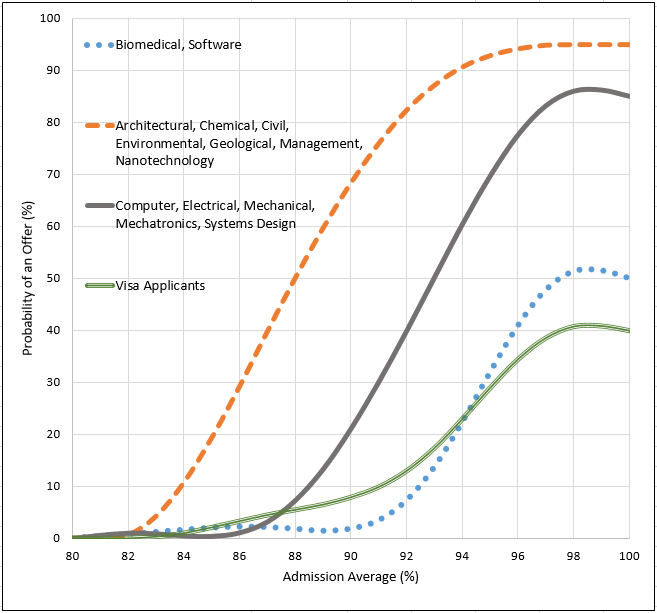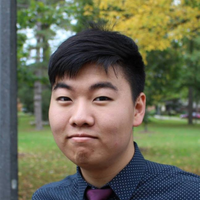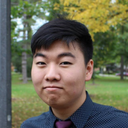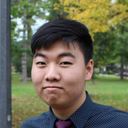My University of Waterloo 2019 Admissions Guide! (just trying to give a piece of my thought : )
Hi guys! I’m currently a 1A->1B Software Engineering student at the University of Waterloo and I wanted to share my experience and tips to help you with your admissions! :) Mind that most of the admissions will be related to the Math/CS and Software Engineering.
1. OUAC Applications
1.1 Apply on OUAC as soon as possible. Most, if not all, universities send out their own account system for admissions and it usually takes them from a couple days to a week for them to send out the emails regarding the account for you.
1.2 University of Waterloo does not look at your OUAC rankings at all. Other universities, such as the University of Toronto, are known for putting your OUAC rankings into their consideration. Personally, when I was applying to universities knowing this, I ranked all of my UofT programs as #1 and #2 on the OUAC rankings.
1.3 Apply as soon as you can for all programs while trying to do your best on the supplementary applications.
2. Admission Information Form (AIF)
2.1 When writing the AIF, most applicants make the mistake of only praisingthe University of Waterloo.
If the question asks you, “Why do you want to come to Waterloo?”, you want to answer it by stating a combination of 2 components.
(What UWaterloo has to offer) + (Why you need that / How you are going to use that to fulfill your goal)
An example of just praising UWaterloo is stating “University of Waterloo has the best co-op program/engineering program/etc”, “University of Waterloo provides the best opportunity to create a startup with its Velocity startup incubator”, and just ending it there because you’ve already filled your 900 character limit. These comments are good for the application in nature; however, you want to do more than just praising UWaterloo.
2.2 Write a personal anecdote about yourself. As mentioned earlier, you need to really emphasize your dreams and add how Waterloo can help you.
2.3 Do research on the University of Waterloo, and specifically, your program. You want to state the uniqueness that Waterloo can offer you, and you want to be detailed about it.
Examples:
- SE provides a cohort setting, different than other programs at Waterloo
- 11 out of Forbes 30 under 30 for 2019 are Waterloo graduates (*Note: there are many categories for Forbes 30 under 30, and each category has 30 people)
- Velocity is the leading entrepreneurship incubator at the University of Waterloo
- Largest CS Department in Canada
- Largest ECE Department in Canada
Try to develop on such unique features about Waterloo into your story.
2.4 Now, I’m going to mention the important questions in each section of the AIF, giving tips on how to write them.
Part A
Question 1: Reasons for choosing your program and Waterloo (*Required) Please tell us about your educational goals, your interest in your chosen program(s), and your reasons for applying to the University of Waterloo. If you have applied to more than one program please discuss your interest in each program. (900 character limit)
Here, you really want to answer ALL the questions that they have. If you analyze it, this question asks three things:
- Educational goals
- Interest in the programs you’re applying for
- Reasons for applying to UWaterloo
You want to answer all of these questions in an anecdotal format, as a story. I personally think there isn’t enough space here to write about what you’ve researched about the program you’re applying to. Rather, really write about yourself, what you want to become, why you started liking the field you’re applying to (ex. Computer Science), and how the SE/CS program at UWaterloo is necessary for your journey to achieve your goals. Because of the 900 character limit, write them as precisely as you can and delete anyunnecessary comment.
Part B
Question 4: Additional Information
In addition to the specific information requested in all of the AIF questions, please tell us anything else about yourself that you would like us to know when we review your application. Please make sure to complete all sections of the AIF before submitting this page. (900 character limit)
Personally, I used this section to write as an extension of Part A, Question 1. Here, you can now explain more thoroughly on what you have prepared so far to achieve your goals (ex. explain about your job experiences, programming challenges you took on). Also, when, writing these sections, make sure that these sentences really show your ambition and personality as well. To do that, you must explain the rationale on why you took these experiences and how they will help you in your life.
Also, you can now mention the research you’ve done on SE/CS as I mentioned in Section 2.3. Now, they’ll recognize how you’ve done research in the programs you’re interested in.
If you didn’t write anything for this question just because it was optional, I don’t think you’re ambitious enough compared to the other applicants to get into the program you want, and that’s what the admission officers think as well when reading your application.
If you’re applying for Engineering, there is an extra engineering section.
Engineering
Because the flow of how I answered these two questions is similar, I’m going to explain both questions at once.
Question 1: Engineering Goals
Briefly explain why you are interested in engineering and particularly in the program to which you have applied. Comment, for example, on your interests and abilities; your career goals; exposure to engineering through school-related and other experiences; and discussions you have had with engineers, teachers, current or past Waterloo students. (900 character limit)
Question 2: More about your goals
What sorts of things would you like to do or accomplish in Waterloo Engineering and why? (900 character limit)
Explanation:
Question 1: Your ambitious goals and what you’ve done so far to prepare for those goals. They ask specifically about the following:
- Your interests and abilities
- Your career goals
- Past exposure to engineering
- Previous discussions with engineers, teachers, and Waterloo students
Question 2: How can Waterloo Engineering help you?
Now, after you explained your ambitious goals, they want to know more about how Waterloo Engineering will help you and what you will be accomplishing here.
Compared to the “About You” sections, they’re asking you for more specific topics in this section. This means that they want to know more in-depth about you. When I wrote these sections, I continued my stream of thoughts from question 1 to question 2 and combined it as if it was just one essay. It made my story flow better for the admission officer to understand easily.
If the “About You” section was on the topic of your broad goals, I wrote these paragraphs more specifically geared towards what I want to accomplish at Waterloo, adding in details here and there, and using unique facts about Waterloo. I provided reasoning behind why I need those accomplishments at Waterloo to succeed in my future goals.
The rest of the AIF are mostly fact-based, meaning you only have to list your previous accomplishments and have fewer opinions/goals about them. For the programming knowledge section, you can also just list your programming knowledge in point form and such.
2.5 Really great websites that I got my AIF advice from was https://bopeng.io/ and https://profbillanderson.com/ (now changed to https://theroadtoengineering.com/ but read both of these websites). On https://profbillanderson.com/, make sure to read all the comments as well since he answers several questions in the reply thread. I highly recommend you guys to read the relevant articles on these websites before writing your AIF.
Pause here for a moment and open your current copy of your AIF if you have one. Check and see if you can improve your AIF in any way.
Slowing down or procrastination on this process of application will cost you your next 4–5 years (and which jobs you will get). I don’t want to pressure you guys to be more pressured than you already are, and this is mostly meant for those who are intending to procrastinate on uni apps.
3. Interview
You should take this online interview as seriously as your AIF. Here are some tips on doing the interview!
3.1 There are 2 questions that Waterloo asks their applicants. The first question is usually about yourself (the applicant) and the second question has a 50/50 chance of it being another one about yourself or a creative/problem-solving question.
3.2 Note that for all of the questions, you have around 30s — 60s for preparation and 60s to 90s to respond depending on the question.
3.3 When it’s actually the time to do the interview, you should have a pencil and paper ready to jot down some of the points you want to say during your prep time.
During the prep time, one thing I did as a Grade 12 was to type down the points that I want to say for that interview question on a word document. Then, you can face the camera while reading the notes during the interview.
3.4 Practice! Practice! Practice! You can practice unlimited times on the user interface that Waterloo uses for online interviews. For practice questions, they ask real questions that were asked to other applicants.
3.5 I would recommend wearing formal or formal casual for doing these types of interviews (university admissions).
3.6 Have a mono-coloured background with good lighting for fewer distractions for the admission officer watching you.
3.7 Make sure to double check your microphone and webcam to make sure that the admission officer watching this can clearly see and hear you.
3.8 Here are some guidelines for each of those 2 categories of questions.
1. First Question: About yourself
Here, you’re really more or less describing yourself to the admission officers and you want to relate it back to why you need to go to Waterloo and why you should be admitted. Essentially, you want to have a relative idea on how to answer these questions by answering similar types of questions beforehand. You can really memorize the answers to the examples I have below if you want.
- ex. What are your biggest weaknesses
- ex. Tell me about yourself.
- ex. Why did you choose to apply to Waterloo Engineering
- ex. What type of co-op jobs do you want to get?
- ex. How can Waterloo prepare you to achieve your goals?
- ex. How do you handle success and how will that help you in your co-op program?
- ex. Recall one time you worked in a team you were not satisfied with. How did you resolve the issue?
- ex. When were you unethical in something you did and how do you reflect back on it? However, these ones may seem slightly twisted (although it’s already general).
Note that the questions can be both straightforward or redirected to something like “What type of job do you want for your first co-op?”, but they essentially ask very similar types of questions.
2. Second Question: Around 50/50 chance of it being another one about yourself or a creative/problem-solving question.
You can’t really have memorized answers for creative/problem-solving questions unlike the previous questions about you. Thus, the best way to prepare these types of questions is by doing more and more practices beforehand. Make sure to use pencil and paper for prep time for this one since you might have to draw diagrams and do calculations to get an organized answer.
- ex. Creative questions: Einstein once said, “The true sign of intelligence is not knowledge but imagination.” How does this quote impact your life?
- ex. Problem Solving questions: The city where you live at is hosting the Olympics for next year. How would you allocate the budgets for the Olympics?
4. FAQs
4.1 The adjustment factor only applies to the Engineering Faculty at the University of Waterloo. There are no adjustment factors for the Math Faculty.
4.2 Early admissions for Software Engineering (and all other engineering programs) accept 25% of their applicant space. Last year, the early admissions came out on Monday of the last week of February.
4.3 Early admissions for Engineering are due by February 1st, please apply before to be considered for early admissions. I remember emailing the general admissions, engineering admissions, SE admissions, etc about this last year as an applicant.
4.4 Early admissions for the Math Faculty (includes Computer Science) is extremely rare (although there are just a few) compared to how the Engineering Faculty processes their early admissions.
4.5 You can change the program you’re applying to on OUAC for the same university without having to pay another fee before the OUAC deadline.
4.6 You can even change which engineering you applied to during admissions. Say you applying to Environment Engineering and already received your early acceptance at the end of February. If you feel that you want to switch the engineering major you applied to, you can contact the admission officer to switch your Engineering application to ex. Computer Engineering, but your previous acceptance will be revoked and your application now has to go through Computer Engineering. You can but I don’t recommend this tbh.
4.7 There’s a Kpop Elective (EASIA 336R) and a more or less Anime Elective (EASIA 120R) for those of you guys interested.
4.8 You should really check out this article about Waterloo admission myths and misconceptions: https://profbillanderson.com/2015/11/21/admission-myths-and-misconceptions/
5. My list of Computer Science/Software Engineering programs to apply for in 2019 (on OUAC)
1/2. Software Engineering/Computer Science (Co-op) — University of Waterloo
3. Mathematics (Co-op) — University of Waterloo
4. Computer Science Dev Degree — Carleton University
5. Software Engineering Dev Degree — York University
6. Engineering Sciences (Machine Intelligence Major) — University of Toronto (St. George)
7. Computer Science (Co-op) — University of Toronto (Scarborough)
8. Computer Science (Co-op) — McMaster University
9. Computer Science (Co-op) — Ryerson University
*Disclaimer: Note that this can be very different from person to person, based on their preferences and skills. This section is extremely subjective. It is just my compilation of which programs I would apply to if I was a Grade 12 this year and the reasons why I would apply to these programs. You do not have to follow or copy what I wrote here, and if you are a parent reading this, don’t force your child to apply to these programs.
My preferences are more geared towards gaining experience in the computer science field and my choices reflect that.
5.1 My 1st/2nd choices are Software Engineering / Computer Science at the University of Waterloo because of its co-op program and the history of successful graduates from those two programs. The University of Waterloo is famous for their innovative graduates in the tech industry. SE/CS programs are very similar in nature (learning CS, preparing for the tech industry) and it’s based on personal preference on what you want to belong into.
Having said that, choosing between SE and CS is a big concern for a lot of students, and I will be explaining that later on this article in Section 7. Here are more websites for information on SE and CS.
https://uwaterloo.ca/future-students/programs/software-engineering
http://ugradcalendar.uwaterloo.ca/page/ENG-Software-Engineering
https://uwaterloo.ca/future-students/programs/computer-science
5.2 My 3rd choice for Mathematics at the University of Waterloo is mainly because of two reasons: Data Science program and the job opportunitiesUWaterloo can still provide with its co-op program. Under Bachelor of Mathematics, the student can declare their major as Data Science in their second year with around 85+ average in first year (this could be very difficult and is not guaranteed, which is the downside). Data Science program, in short, involves methods of database management, statistics, machine learning, and distributed/parallel systems. It’s an integration of both CS/Statistics, and as a Data Science student, you have the same access as the CS students at UWaterloo (now you’re basically a CS student). Furthermore, as a BMath, many students still go into the tech industry to pursue software developer jobs as long as they still have an interest in the field, and WaterlooWorks system still allows BMath students to apply to the tech companies.
*Note that there is also Bachelor of Computer Science Data Science which is very similar to BMath Data Science. You can check more here:
https://uwaterloo.ca/data-science/undergraduate-program
5.3 My 4th/5th choices would be the Shopify Dev Degree programs at Carleton University and York University. The Shopify Dev Degree program guarantees you a developer position at Shopify for all four years of university. You essentially earn a BCS degree along with 4 years of experience, preparing you as a future software engineer in the tech industry. Optimally, gaining experience at Shopify for the first year, then transitioning into bigger companies or into fields that you want to explore would be the best. Carleton University would be the third choice instead of York University since Carleton University initially started with this program and it has worked out for them well; whereas, it’s York University’s first year trying out this program.
https://carleton.ca/scs/future-students/bcs-internship/
https://www.devdegree.ca/
5.4 My 6th choice would be Engineering Sciences (Machine Intelligence) at the University of Toronto. Engineering Sciences is a really great program, one of the best engineering programs at the University of Toronto. The only set back is that this is essentially an engineering program, so there are lots of non-CS related courses you would have to take. Furthermore, the Eng Sci majors, such as the Machine Intelligence program, start at Year 3, so you have to wait for two years. Nevertheless, the Machine Intelligence major provides students with a cutting-edge education in mathematics, computation, computer hardware, and software engineering behind artificial intelligence (AI), machine learning, and big data analytics. There is also the Professional Experience Year (PEY) at U of T Engineering where you can work 12–16 months at a company, gaining experience and earning money.
http://engsci.utoronto.ca/explore_our_program/majors/machine-intelligence/
5.5 My 7th/8th/9th choices are pretty much back-up CS programs with co-op programs. McMaster University and Ryerson University would be on the easier end of getting GPA; whereas, U of T Scarborough can be more difficult and has a so-called label (label as in U of T is seen positively by employers). Although the tech industry does not often value the university that their applicants attended, there are still target schools that big companies might look students for, and U of T is one of them.
5.6 Programs I didn’t rank
U of T St. George Computer Science
Firstly, their POST 2nd-year cutoff is insanely high, especially considering that earning GPA is very difficult at U of T. For those of you who do not know what POST is, it’s a special requirement that U of T set for their first-year CS students if they want to progress to 2nd year CS. Also, they recently changed their POST requirements so that other majors applying for 2nd year CS have the same GPA cutoff for POST, which I think is ridiculous. Compared to U of T Scarborough CS, the POST requirement is higher, making it way more competitive to continue as a CS major. You’re not guaranteed a major in CS even if you were admitted as a CS major. One good thing is that U of T CS does offer the PEY program as well, but I can’t say it is equivalent to a co-op program at Waterloo.
I do think U of T CS is a great program, but the POST requirement just really throws me off :( You should still apply if you think so.
UBC, McGill University
I’ve heard that the CS and CE program at UBC and McGill are pretty good, but for both of these universities, I don’t think I have enough knowledge about them to write reviews.
There may be other universities with their CS programs but I haven’t heard of them. So no comments on universities that I do not know.
6. Wants to do Software Engineering (SE) but don’t know what the backups should be? Or SE seems too competitive and wants to apply for a different program?
6.1 First of all, I want to clear the confusion about when students should or shouldn’t apply for Software Engineering and consider a different engineering major. I constantly hear people not wanting to apply for Software Engineering because it seems too competitive. I think that is a logical thought that students should have but sometimes people misjudge when or when they shouldn’t apply for SE. I think the line where people shouldn’t have any of those thoughts is when you have a 93+ average. This might be very different for each case so I don’t want to suggest that you should not apply to SE if you have a top 6 average under 93. Rather, I’m trying to suggest that if you have a 93+ average, you shouldn’t be discouraged to apply to SE. The stats are as follows:

This is the Admissions Chances graph for 2019. Following the SE curve, the blue dotted lines, you have approximately 14% chance of being admitted with a 93.
6.2 My thoughts on back-up or alternative choices.
For Engineering, common backup choices for SE are often:
- Systems Design Engineering (SYDE)
- Computer Engineering (CE)
- Mechatronics Engineering (MTE).
People might have a hard time considering between these programs and Software Engineering or choosing the alternate program between these.
Firstly, SYDE and CE can get good programming co-op jobs and are not at a disadvantage. Note that SYDE has their own system of courses (SYDE XXX course codes) and their academics are slightly easier than SE/CE. This also means that you would have more freedom to explore other options than just programming and work on side projects. If you want to explore more about what you want to do later on, whether it be a developer, product manager, consultant, etc, I highly recommend this program.
Looking at my friends’ courses in CE, there are many overlaps in first year and diverge afterward. Also, both CE and SE seem to be at the same level of difficulty. The only major difference is that SE takes CS and MATH courses offered by the Math Faculty while CE courses are mainly offered by the ECEdepartment. If you want to know more about the computer as a whole, I recommend you guys to apply for CE. Also, I wrote a comparison between SE vs CS vs CE below, so check that out.
MTE is not geared towards programming jobs and deals more with robotics and machines. Those jobs require more robotics knowledge (both hardware and software but mostly robotics-oriented hardware) and it might not be the best alternative if you want to work in the software field. However, if you’re really interested in Robotics from high school (First Canada, Robotics Competitions, etc), I recommend this program.
Tbh, I think all of these programs are extremely good, and it’s really important to figure out which one would suit what you want to do in the future the most. Please look in-depth about each of these programs in the following links instead of judging the major based on its name. Lots of people apply to their majors without knowing much about them, only to find out that they don’t really like it or their job prospects don’t fit the major they’re studying.
http://ugradcalendar.uwaterloo.ca/page/ENG-Systems-Design-Engineering
http://ugradcalendar.uwaterloo.ca/page/ENG-Computer-Engineering-Electrical-Engineering
http://ugradcalendar.uwaterloo.ca/page/ENG-Mechatronics-Engineering
7. Difference between Software Engineering, Computer Science, Computer Engineering at UWaterloo
University of Waterloo does have an article about this right here: https://uwaterloo.ca/software-engineering/future-undergraduate-students/frequently-asked-questions
However, I’m going to show my perspective of them as a first-year student with the help of my friends who are in each of those disciplines.
Firstly, for most of the time, students in all 3 disciplines have relatively the same job prospects: software engineer/developer. The difference really comes in when talking about academics and the study environments.
Software Engineering (SE)
- The general focus of SE is spent on the applications of softwarecompared to CS and CE. It’s more about the entire process of software development from idea to final product
- SE 1A 2018: 125 students
- All 5 years are taken with the same cohort. That is, you’re in class with the same group of people for all, if not most, of your courses. This helps you to build stronger friendships/connections during your time at university
- Influenced by both the Engineering Faculty and the Math Faculty. Note that your promotion requirements and rules are different for each faculty so you should check them out
- I do see a trend of SE students getting better professors than CE students in comparison, but this might be just my subjective first-year observation
- There are barely any choices for electives compared to CS since has a lot of required courses. Pursuing double degrees/majors/joints/minors/options can be heavy on your course term but is still very possible
- There is more freedom of switching majors in SE than other programs at Waterloo. You can easily switch from SE to CS or CE but the vice versa will require you to maintain an extremely high GPA/ranking
Computer Science (CS)
- The general focus of CS is about the core concepts of computer science, learning data structures, algorithms, programming techniques, and such. Because of its flexibility, you can choose to specialize in one or more fields of computer science in upper years by taking specific courses
- CS 1A 2018: ~300 students
- All of your courses are pretty much with different people, so people that you meet during a certain class, you might never see them again
- Double or triple the percentage of international students compared to SE/CE. This is mostly because the Canadian government sets a cap of 15% for the maximum percentage of international students in an engineering program. CS is under the Math Faculty so it does not have that
- Strictly under Math Faculty, this changes a lot of things actually (term promotion requirements, graduation requirements, etc)
- Lots and lots of electives! A lot of CS students end up doing double degrees/majors/joints/minors/options (and a mix of the whole bunch). This is actually very critical if you want to do more than just CS for 5-years and do something else you also like
Computer Engineering (CE)
- The general focus of CE is spent on the system of computers, learning both digital hardware of the computer and the software that controls it
- ECE 1A 2018: 372 students (meaning both EE and CE students)
- Somewhat of a cohort. Majority of the courses are just taken with ECE students but there are a lot of ECE students in the first place so it’s not grouped as much as SE
- Strictly under Engineering Faculty
- Similar to SE, there aren’t many choices for electives due to the high load of required courses. Doing double degrees/majors/joints/minors/options can be heavy on your course term but is still very possible.
Really good references on SE vs CS vs CE:https://aimango.postach.io/post/university-of-waterloo-software-engineering-vs-computer-science
https://uwaterloo.ca/software-engineering/future-undergraduate-students/frequently-asked-questions
https://uwaterloo.ca/software-engineering/future-undergraduate-students/comparing-bse-bcs
I know most of you guys have already started writing your app for Waterloo but I still hoped this cleared away some of the questions you guys had in your mind about Waterloo!
My article on Medium: https://medium.com/uwaterloo-voice/my-university-of-waterloo-2019-admissions-guide-just-trying-to-give-a-piece-of-my-thought-61e1569d38be



